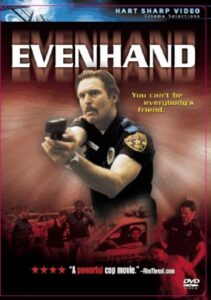
Anger management, Morning-style
![]() EVENHAND WILL SCREEN ON THE SUNDANCE CHANNEL
EVENHAND WILL SCREEN ON THE SUNDANCE CHANNEL ![]()
…check sundancechannel.com for info
We are in a world of seemingly limitless opportunities to have entertainment delivered to us: 1000 channels on the cable box; 30 cinemas under one roof; video stores on every corner; and more film festivals than even I can obsessive-compulsively keep track of. But, for producers of truly independent film, there is very little good news in all of this.
“The unsung villain in all of this is Blockbuster Video. Because Blockbuster has made it their mandate that they won’t shelve an NC-17 film, and when you have a company that takes up 85 percent of the video business, maybe more, it’s tough. Every distributor who’s looking to the ancillary market to make more money or make up what the film didn’t make theatrically, has to take that into consideration.” – Kevin Smith (discussing Dogma) 1
“sex, lies and videotape was like the first time you had sex. Everybody since then has been trying to recreate the moment, but it was an aberration.” – Tom Bernard 1
[Pulp Fiction’s success] “…became a problem for non-genre, character-driven stuff…slow-moving tales with no violence and no big stars…and than kind of put an end to the dream that we had in the early ’90’s.” – Allison Anders 1
“The commitment to meticulously engineered mediocrity suggests that the American movie industry, in its timid, defensive attempts not to alienate the audience, is doing just that.” – A.O. Scott, The New York Times, 5/05/05
I recently e-mailed a representative of Arts Alliance America to find out how they did in positioning EvenHand with video/DVD retailers. Here is his response:
—–Original Message—–
From: _________
Wednesday, February 04, 2004 10:28 AM
To: joseph(at)cypressfilms.com
Subject: RE: EvenHand Distribution
“The lack of recognizable cast and no box-office hurt the film’s chances at getting placed in a lot of venues. Most retailers are not bringing in titles that did not play theatrically unless they are full on genre films (horror, heavy duty action) or cast driven. Over the past four-five months the direct to video business has been seriously hurt by the rise in sales of DVD’s. This has shrunk the open to buy for films like yours. We are suffering because of it on other titles as well. It is a fundamental change in the buying habits of the buyers. This has changed the way we acquire films as well. When we opened last Jan. we truly felt we would be able to do a fair amount of business releasing smaller films that we believed in. Evenhand was one of them. A film titled Charlotte Sometimes was another. Neither film worked in the marketplace. We are currently looking at our acquisition strategies to determine if we can continue to release films like Evenhand and be profitable at the same time. The majors are not supporting product like this and we had hoped that we could fill that void. We are still searching for a way to do that. I know this is not anything you want to hear but I’ve always felt that the truth is the best way. It’s not a pretty picture but an accurate one. If you want to discuss this further I’d be more than happy to sit with you over a lunch or cup of coffee.
“A lot of really quality films can never get mainstream distribution. Those films left on the table can’t find a way to reach theatrical audiences with the current economic model.” – Ira Deutchman, partner, Emerging Pictures (discussing his digital distribution network)
“Complex films have become difficult to market, junk easy to market, and at the end of the year everyone scratches their head and wonders why they cannot come up with a 10-best list.” – Russell Smith, producer of Ripley’s Game starring John Malkovitch (discussing the circumstances of the film going directly to DVD in the USA)”
Here’s my reply:
“Thanks for your very candid response. I am painfully aware that EvenHand is a film that suffered because of the vagaries of the marketplace. We didn’t get a theatrical release for many of the same reasons that you cite as reasons for the film not getting picked up by the major video retailers. I received many very complimentary e-mails from theatrical distributors telling me how much they loved the film and in the same paragraph telling me that there was no way they could release it. I had hoped that we could overcome those very real marketing concerns in the video world, but obviously the same forces are governing how those retailers do business. I’m just pleased that we managed to slip through a window of opportunity at Hart Sharp. Evelyn and your team did a great job on the DVD presentation, graphics and extras.”
It became clear while I was shopping EvenHand around that if I am lucky enough to make another film, it will have to have stars in it to have a chance of being successful. I would not have done anything differently on EvenHand, but I can’t afford to make another film that way.
“I go to Cannes and Venice and see amazing small films, and we rack our brains – how can we take these on and make money? At the end of the day we don’t, because we have to make a financial decision.” – Ruth Vitale, co-president of Paramount Classics
What is the future of truly independent films? By the modifier “truly,” I mean to exclude films like Shakespeare in Love, which while it is called independent, was made with stars and the backing of a major studio. Anyone with the wherewithal to make a film with known actors and a $5 million+ budget has achieved something admirable, but the result can only be called “independent” by a disingenuous and somewhat cynical definition of the word. But, my point is not to present an embittered criticism of films that I, in fact, admire and enjoy. Rather, I ask you to ponder how films like EvenHand can continue to be made. I know it won’t be me making another film that way. Frankly, there’s too little reward in it.
Sure, I got to be the boss and make all the creative decisions without some studio business school graduate breathing down my neck. And, yes, I worked harder and had more fun than I’ve ever had on a film set. And there’s no doubt that I will always remember the whole experience with great pride and satisfaction. And it’s not really about the money. Far more important is having my film seen by a wider audience. The only way that could have happened was through a theatrical release or if it had been picked up by the major video retailers.
There will always be films without stars that are championed by distributors and embraced by the public, but for every micro-budgeted gem that finds a theatrical deal, there is a film that gets distribution for reasons related directly to the presence of stars or a clear demographic appeal. On the flip side, there are indie films out there that deserve yet never get a theatrical release because they lack an obvious marketing hook.
“People do get rich making movies; more often than not, they’re the wrong people” – Louis Menand, The New Yorker
When evaluating a film, the first question a distributor asks is “How can we market this film?” The burning question isn’t whether the critics will like it, or how many prizes it’s won, but “How the hell are we going to put fannies in seats and make our money back?” It would be naïve to suggest that stars don’t help.
Having said that, the performances of Bill Sage and Bill Dawes are excellent in EvenHand and I want to emphasize that I am thrilled that they are in my film. I cast them both because I recognized their talents and have no regrets about having done so. If I had my way, I would only cast unknowns; I just don’t think it is a pragmatic choice going forward.
Is EvenHand a film that deserved a theatrical release? I will not presume to answer that question; some people thought it did, others disagreed. I also hope this entry is not misinterpreted as an exercise in blaming anyone for the disposition of my film. I am proud to have premiered the film on the Sundance Channel and to have had a terrific video/DVD release with Hart Sharp Video.
“History rewards the winners – Soderberg, Tarantino, the Andersons, Payne, Russell, and so on – and they will insist, as does [Christine] Vachon, that good filmmakers always rise to the top, dismissing those that don’t as losers or whiners or hacks. But the new rules of the indie game are weighted heavily toward box office success, with promising or even brilliant but uncommercial films failing to get picked up for distribution, witness the fate that befell L.I.E and The Believer.” – Peter Biskind, Down and Dirty Pictures
I do believe, however, that if you’re a fan of independent film, you are going to find it more and more difficult to see provocative, non-genre films with no stars. When idealistic companies like Arts Alliance America discover that their business models have no validity, they will do the only thing they can do: change. For every Hart Sharp that stops distributing indie films, there will be fewer independent films released. And when the diversity of entertainment is diminished, we all lose.
And don’t be fooled into thinking that people burning their own DVDs and self-distributing them on the net is the answer. Without the publicity machine that the big boys have at their disposal, no one ever hears about those films. There’s too much noise being generated about the scores of studio movies being released every five seconds and too much attention lavished on the big stars that populate films of all sizes (just look at the Sundance Film Festival catalogue for any of the last few years and see who’s starring in the indies now). The other self-releasing option, Four-walling, is still a possibility in select markets, but it’s nearly impossible in major markets like New York or L.A.; and everywhere you butt up against the same problem: getting lost in a sea of “Starsky & Hutch” swill — posters, TV spots, bus shelter ads and Letterman interviews (Ben Stiller was on last night).
What can you do about this dire situation? A short-term solution springs to mind: get a pizza and rent or buy EvenHand.
Post Script, quoted from Eugene Hernandez’s indieWIRE blog (May 3, 2006):
“At a Tribeca Film Fest panel last night, Steven Soderbergh had a few intriguing comments that didn’t quite make it into my indieWIRE article about the event…
One comment echoed a sometimes unpopular sentiment that I often share with filmmakers. “I don’t know of many secret, great movies,” Soderbergh said, later citing “Tarnation” as a true success story and a personal favorite. “If you make a great movie and somebody sees it, they tell somebody else.”
Post Post Script, quoted from a journalist (N.Y. Times) and friend (September 7, 2006):
“I think Stephen Soderberg’s early success has made him delusional. I don’t think film is any different from any other field where the real secret to success rests less on talent than on marketing.
When I was writing on wines, I ran into a bunch of wine-makers who failed not because they didn’t know how to make a good bottle of wine (some of their stuff was amazing), but because they assumed that success would result from their wine-making skills. Every one of them said that they wished they had realized early on that success in wines results largely from a good label and marketing team, not good taste.”
Please also read Anthony Kaufman’s excellent article Ghost of the Machine, in the Village Voice 5/25/02
Here’s some information on where you can find EvenHand

– Joseph Pierson



